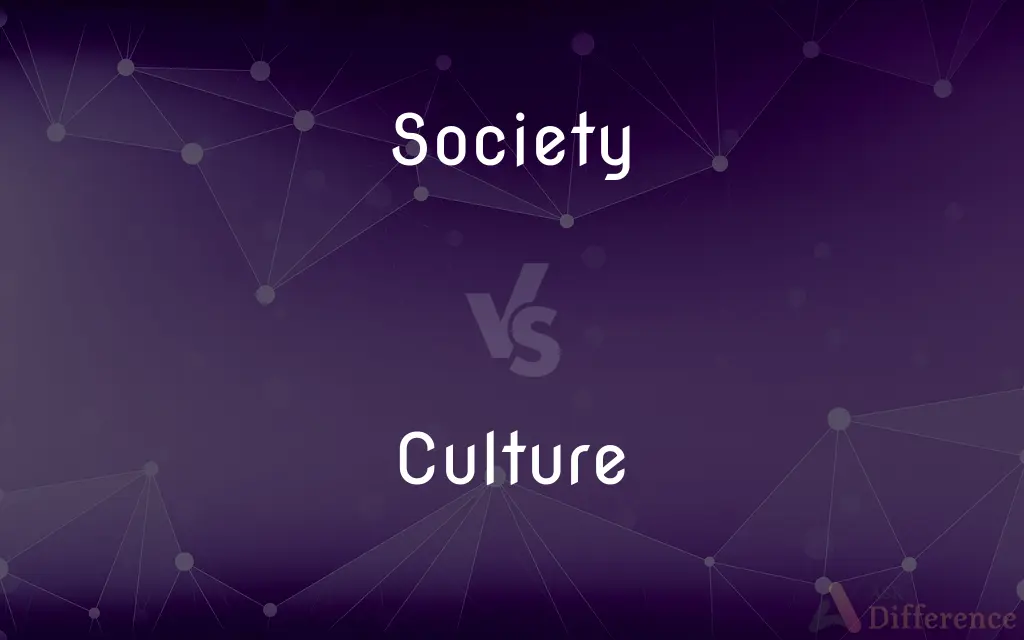Society vs. Culture — What's the Difference?
By Fiza Rafique & Urooj Arif — Updated on April 1, 2024
Society refers to a group of individuals sharing a common geographical region and social institutions, whereas culture encompasses the beliefs, practices, norms, and values shared by these individuals.

Difference Between Society and Culture
Table of Contents
ADVERTISEMENT
Key Differences
Society and culture are intertwined concepts that describe different aspects of human communities. Society refers to the structure and organization of groups of people who share a common territory, including their social institutions, economies, and political structures. It focuses on the relationships and social arrangements that enable people to live together. Culture, on the other hand, pertains to the shared beliefs, behaviors, languages, practices, and expressions considered characteristic of a particular group. It encompasses the arts, customs, and habits that define how people in a society live, communicate, and understand the world around them.
While society provides the framework within which people interact, culture gives society its content, meaning, and character. Societies are defined by their social structures and institutions, such as family units, governments, and educational systems, which organize and regulate human interactions. Culture is the collective knowledge, culinary traditions, language, laws, and art that fill these structures with life and meaning.
Cultural elements like language, religion, and traditions are crucial for fostering a sense of identity and belonging among members of a society. These elements are passed down from generation to generation, evolving over time while maintaining continuity. Societies, through their cultural practices, dictate norms and values that guide individual behavior, ensuring social cohesion and continuity.
While all cultures are manifested within societies, the scale and diversity of cultures can vary significantly within or across societal boundaries. A single society may encompass multiple cultural groups, each with its own distinct practices and beliefs. Conversely, a single culture can spread across multiple societies, especially in our increasingly globalized world.
The relationship between society and culture is dynamic. As societies evolve, so do their cultural practices and norms, influencing each other in a continuous feedback loop. Societal changes can prompt cultural shifts, which in turn can lead to further changes in social structures and institutions.
ADVERTISEMENT
Comparison Chart
Definition
A group of individuals sharing a common geographical region and social institutions.
The beliefs, practices, norms, and values shared by individuals in a society.
Focus
Social structures, institutions, and relationships.
Shared beliefs, behaviors, languages, and expressions.
Key Elements
Family units, governments, educational systems, economies.
Language, religion, traditions, art, laws.
Function
Organizes and regulates human interactions.
Fosters identity, belonging, and continuity.
Variation
Defined by geography and social organization.
Can vary within and across societies.
Compare with Definitions
Society
Evolves over time, adapting to internal and external changes.
Societies respond to technological advancements by updating social norms and institutional structures.
Culture
The collective manifestation of human intellectual achievement, including language, art, and traditions.
Cultural festivals celebrate the unique artistic and traditional expressions of a community.
Society
Governed by social institutions that regulate behavior and interactions, such as legal and political systems.
Democratic societies are structured around the principle of individual rights and collective decision-making.
Culture
Reflects the diversity within societies and can transcend geographical and political boundaries.
Globalization has led to the spread of cultural elements, such as cuisine and music, across the world.
Society
Can include multiple cultural groups, reflecting the diversity of beliefs and practices within a common geographical area.
Multicultural societies celebrate the diversity of their inhabitants' cultural backgrounds.
Culture
Transmitted from generation to generation, evolving while maintaining continuity.
Cultural traditions are passed down through stories, rituals, and practices, preserving a sense of heritage.
Society
Promotes social cohesion and order through shared norms and laws.
Social norms in various societies dictate acceptable behavior, helping maintain order and cohesion.
Culture
Defines the way of life for a community, including norms, values, customs, and beliefs.
The culture of a community influences its members' views on family, education, and governance.
Society
Comprises individuals living together in organized communities with shared laws, traditions, and values.
Modern societies are often complex, with diverse populations and multifaceted social structures.
Culture
Influences and is influenced by societal structures and institutions.
Educational institutions play a key role in transmitting cultural values and knowledge.
Society
A society is a group of individuals involved in persistent social interaction, or a large social group sharing the same spatial or social territory, typically subject to the same political authority and dominant cultural expectations. Societies are characterized by patterns of relationships (social relations) between individuals who share a distinctive culture and institutions; a given society may be described as the sum total of such relationships among its constituent of members.
Culture
Culture () is an umbrella term which encompasses the social behavior and norms found in human societies, as well as the knowledge, beliefs, arts, laws, customs, capabilities, and habits of the individuals in these groups.Humans acquire culture through the learning processes of enculturation and socialization, which is shown by the diversity of cultures across societies. A cultural norm codifies acceptable conduct in society; it serves as a guideline for behavior, dress, language, and demeanor in a situation, which serves as a template for expectations in a social group.
Society
The aggregate of people living together in a more or less ordered community
Drugs, crime, and other dangers to society
Culture
The arts, beliefs, customs, institutions, and other products of human work and thought considered as a unit, especially with regard to a particular time or social group
Edwardian culture.
Japanese culture.
Society
An organization or club formed for a particular purpose or activity
The Royal Society for the Protection of Birds
Culture
These arts, beliefs, and other products considered with respect to a particular subject or mode of expression
Musical culture.
Oral culture.
Society
The situation of being in the company of other people
She shunned the society of others
Culture
The set of predominating attitudes and behavior that characterize a group or organization
A manager who changed the corporate culture.
Society
The totality of people regarded as forming a community of interdependent individuals
Working for the benefit of society.
Culture
Mental refinement and sophisticated taste resulting from the appreciation of the arts and sciences
A woman of great culture.
Society
A group of people broadly distinguished from other groups by mutual interests, participation in characteristic relationships, shared institutions, and a common culture
Rural society.
Literary society.
Culture
Special training and development
Voice culture for singers and actors.
Society
An organization or association of persons engaged in a common profession, activity, or interest
A folklore society.
A society of bird watchers.
Culture
The cultivation of soil; tillage
The culture of the soil.
Society
The wealthy, socially dominant members of a community. Also called high society.
Culture
The breeding or cultivation of animals or plants for food, the improvement of stock, or other purposes.
Society
Companionship; company
Enjoys the society of friends and family members.
Culture
The growing of microorganisms, tissue cells, or other living matter in a specially prepared nutrient medium.
Society
(Biology) A colony or community of organisms, usually of the same species
An insect society.
Culture
Such a growth or colony, as of bacteria.
Society
(countable) A long-standing group of people sharing cultural aspects such as language, dress, norms of behavior and artistic forms.
This society has been known for centuries for its colorful clothing and tight-knit family structure.
Culture
To cultivate (soil or plants).
Society
(countable) A group of people who meet from time to time to engage in a common interest; an association or organization.
It was then that they decided to found a society of didgeridoo-playing unicyclists.
Culture
To grow (microorganisms or other living matter) in a specially prepared nutrient medium.
Society
(countable) The sum total of all voluntary interrelations between individuals.
The gap between Western and Eastern societies seems to be narrowing.
Culture
To use (a substance) as a medium for culture
Culture milk.
Society
(uncountable) The people of one’s country or community taken as a whole.
Our global society develops in fits and starts.
Culture
The arts, customs, lifestyles, background, and habits that characterize humankind, or a particular society or nation.
Society
(uncountable) High society.
Smith was first introduced into society at the Duchess of Grand Fenwick's annual rose garden party.
Culture
The beliefs, values, behaviour and material objects that constitute a people's way of life.
Society
A number of people joined by mutual consent to deliberate, determine and act toward a common goal.
Culture
The conventional conducts and ideologies of a community; the system comprising the accepted norms and values of a society.
Society
The relationship of men to one another when associated in any way; companionship; fellowship; company.
There is society where none intrudesBy the deep sea, and music in its roar.
Culture
(anthropology) Any knowledge passed from one generation to the next, not necessarily with respect to human beings.
Society
Connection; participation; partnership.
The meanest of the people and such as have the least society with the acts and crimes of kings.
Culture
(botany) Cultivation.
Society
A number of persons associated for any temporary or permanent object; an association for mutual or joint usefulness, pleasure, or profit; a social union; a partnership; as, a missionary society.
Culture
(microbiology) The process of growing a bacterial or other biological entity in an artificial medium.
Society
The persons, collectively considered, who live in any region or at any period; any community of individuals who are united together by a common bond of nearness or intercourse; those who recognize each other as associates, friends, and acquaintances.
Culture
The growth thus produced.
I'm headed to the lab to make sure my cell culture hasn't died.
Society
Specifically, the more cultivated portion of any community in its social relations and influences; those who mutually give receive formal entertainments.
Culture
A group of bacteria.
Society
An extended social group having a distinctive cultural and economic organization
Culture
(cartography) The details on a map that do not represent natural features of the area delineated, such as names and the symbols for towns, roads, meridians, and parallels.
Society
A formal association of people with similar interests;
He joined a golf club
They formed a small lunch society
Men from the fraternal order will staff the soup kitchen today
Culture
(archaeology) A recurring assemblage of artifacts from a specific time and place that may constitute the material culture remains of a particular past human society.
Society
The state of being with someone;
He missed their company
He enjoyed the society of his friends
Culture
(euphemism) Ethnicity, race (and its associated arts, customs, etc.)
Society
The fashionable elite
Culture
(transitive) to maintain in an environment suitable for growth especially of bacteria cultivate}}
Culture
(transitive) to increase the artistic or scientific interest in something cultivate}}
Culture
The act or practice of cultivating, or of preparing the earth for seed and raising crops by tillage; as, the culture of the soil.
Culture
The act of, or any labor or means employed for, training, disciplining, or refining the moral and intellectual nature of man; as, the culture of the mind.
If vain our toilWe ought to blame the culture, not the soil.
Culture
The state of being cultivated; result of cultivation; physical improvement; enlightenment and discipline acquired by mental and moral training; civilization; refinement in manners and taste.
What the Greeks expressed by their paidei`a, the Romans by their humanitas, we less happily try to express by the more artificial word culture.
The list of all the items of the general life of a people represents that whole which we call its culture.
Culture
The cultivation of bacteria or other organisms (such as fungi or eukaryotic cells from mulitcellular organisms) in artificial media or under artificial conditions.
Culture
Those details of a map, collectively, which do not represent natural features of the area delineated, as names and the symbols for towns, roads, houses, bridges, meridians, and parallels.
Culture
To cultivate; to educate.
They came . . . into places well inhabited and cultured.
Culture
A particular society at a particular time and place;
Early Mayan civilization
Culture
The tastes in art and manners that are favored by a social group
Culture
All the knowledge and values shared by a society
Culture
(biology) the growing of microorganisms in a nutrient medium (such as gelatin or agar);
The culture of cells in a Petri dish
Culture
(bacteriology) the product of cultivating micro-organisms in a nutrient medium
Culture
A highly developed state of perfection; having a flawless or impeccable quality;
They performed with great polish
I admired the exquisite refinement of his prose
Almost an inspiration which gives to all work that finish which is almost art
Culture
The attitudes and behavior that are characteristic of a particular social group or organization;
The developing drug culture
The reason that the agency is doomed to inaction has something to do with the FBI culture
Culture
The raising of plants or animals;
The culture of oysters
Common Curiosities
How does culture impact society?
Culture shapes societal norms, values, and practices, influencing how individuals interact and understand their roles within the community.
What role do institutions play in culture?
Institutions like education, religion, and media disseminate and reinforce cultural norms and values.
How do societies change?
Societies change through internal developments, such as technological advancements, and external influences, like cultural exchange or migration.
Can a society exist without culture?
No, culture is integral to society, providing the shared beliefs and practices that bind individuals together.
How is cultural identity formed?
Cultural identity is formed through shared language, traditions, beliefs, and practices, fostering a sense of belonging and unity among community members.
Can cultural practices evolve over time?
Yes, cultural practices evolve in response to changing societal needs, influences, and technological advancements, reflecting the dynamic nature of human communities.
What is the difference between a multicultural and a monolithic society?
A multicultural society includes a variety of cultural groups with distinct traditions and practices, while a monolithic society is characterized by a dominant culture that shapes the societal norms and values.
What happens when different cultures interact within a society?
Interaction between different cultures can lead to cultural exchange, adaptation, and sometimes conflict, but also to rich diversity and innovation.
How do societies maintain order?
Societies maintain order through the establishment and enforcement of norms, laws, and institutions that regulate individual and group behavior.
Why is cultural diversity important in a society?
Cultural diversity enriches a society by introducing a range of perspectives, practices, and innovations, enhancing social adaptability and creativity.
Share Your Discovery

Previous Comparison
Munch vs. Lunch
Next Comparison
Audit vs. InspectionAuthor Spotlight
Written by
Fiza RafiqueFiza Rafique is a skilled content writer at AskDifference.com, where she meticulously refines and enhances written pieces. Drawing from her vast editorial expertise, Fiza ensures clarity, accuracy, and precision in every article. Passionate about language, she continually seeks to elevate the quality of content for readers worldwide.
Co-written by
Urooj ArifUrooj is a skilled content writer at Ask Difference, known for her exceptional ability to simplify complex topics into engaging and informative content. With a passion for research and a flair for clear, concise writing, she consistently delivers articles that resonate with our diverse audience.














































